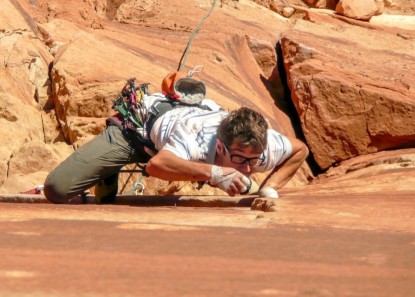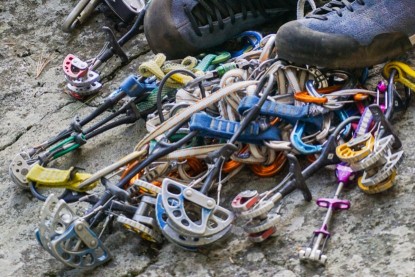With an extremely narrow head, this Black Diamond cam is one great small camming device at getting in tight spots. It has only three lobes that pack tightly together with no space in between. The good news is that it is easy to get them in tiny pods. The bad news is that these cams tend to walk more than others due to the narrow head and stiff stem. The stiff stem also makes them awkward in weird aid placements where there is more “torquing out.” In those applications a more flexible stem is better. It can be nice to have a set of these on El Cap, but we prefer the new Black Diamond Camalot X4 which is only a little wider and has much more holding power and versatility.
I really like this climbing cam in some applications but am not ready to commit my whole rack to them like I have with the Black Diamond Camalot for the bigger sizes. I prefer a four-cam design like the Metolius Master Cam or the X4 that feels more bomber, is less likely to walk, and works in pin scars better. But if you climb in an area with lots of small parallel-sided pods, these may be the best for that specific application. They are more expensive than the rest of the cams but should have above average durability.Black Diamond Camalot C3 Review
Our Verdict
Our Analysis and Test Results
Likes
The Black Diamond Camalot C3 has the narrowest head by far, which makes it the best cam at getting in tight spots. It also goes down to a really small size. When you place a cam that small it can be scary to fall on. However, it is much better than no cam at all and many other cams won't get in spots so small. The stem is durable; you can bounce test these and contort them and they generally hold up well. The trigger is easy to use and has a nice big comfy spot for your hand. This is one of the easiest small cams to clean.
Dislikes
The stiff and burly stem, although durable, makes them awkward in some shallow placements such as pin scars. They can be a little tricky to get in a placement and, when weighted, there is more “torquing out.” In those applications a more flexible stem is better. This cam was the mostly likely to walk for four reasons: stiff stem, narrow head, short sling and only three cams. Yes you can always add runners, but it would be nice if this cam had a longer sling. The three-cam design also means that it does not work well in flared cracks where four-cam units do much better.
Best Application
The C3 is ideal for places with small, parallel-sided pods. It is not ideal for aid climbing; better for free climbing.
Value
These are the most expensive small cams we tested, $10-15 dollars more than most small cams, which means they will cost another $100-plus if you want a double set. .




